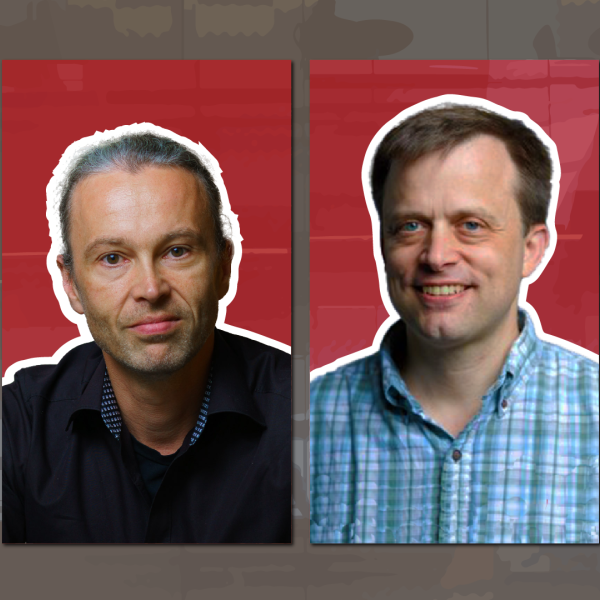February 22, 2024
By Louis DiPietro
Thorsten Joachims and Andrew Myers, two faculty members from the Cornell Ann S. Bowers College of Computing and Information Science, have each received prestigious named professorships in honor of past university luminaries.
Jacob Gould Schurman Professor
Joachims, professor of computer science and information science and Cornell Bowers CIS’s inaugural associate dean for research, has been named Jacob Gould Schurman Professor of computer science and information science, the sixth current Cornell faculty member to share the professorship named for the university’s third president. Joachims joins Éva Tardos, chair of computer science, as the second Jacob Gould Schurman Professor within Cornell Bowers CIS.
Joachims is a leading figure in artificial intelligence, particularly in the fields of machine learning and data mining. His research focuses on machine learning methods that enable intelligent systems to learn from their human users in applications ranging from search and recommendation systems to large language models. He is a fellow of the Association for the Advancement of Artificial Intelligence as well as the Association for Computing Machinery, and was selected as an inaugural member of the latter’s Special Interest Group on Information Retrieval Academy in 2021. Joachims also received the Special Interest Group on Knowledge Discovery and Data Mining Innovation Award in 2020. He has served previously as an action editor for both the Machine Learning Journal and the Journal of Machine Learning Research. Joachims received his Diplom and Ph.D. in computer science from the Universitat Dortmund, Germany, in 1997 and 2001, respectively. He joined Cornell Bowers CIS in 2001.
The Jacob Gould Schurman Professorship of German Literature was established in 1967 by a gift from Jacob Gould Schurman III, who came to Cornell in 1886 as the first Susan Linn Sage Professor of Philosophy. Four years later, he was named the first dean of the Sage School of Philosophy, and in 1892, became the third president of Cornell University. He served as president for 28 years, the longest presidency at the university to date, and in retirement, was the minister to China and then the ambassador to Germany. He passed away in 1942.
Class of 1912 Professor of Engineering
Myers, professor of computer science, has been named the Class of 1912 Professor of Engineering. He joins James Renegar of the School of Operations Research and Information Engineering as the university’s two current Class of 1912 Professors of Engineering.
A leader in computer security, Myers focuses on practical, sound, expressive languages and systems for enforcing information security. He is an Association for Computing Machinery (ACM) fellow, a recipient of both an Alfred P. Sloan Research fellowship and National Science Foundation (NSF) CAREER award, and his research has received numerous other awards and honors. Myers is past editor-in-chief for ACM Transactions on Programming Languages and Systems (TOPLAS) and past co-editor-in-chief for the Journal of Computer Security. He is a member of the scientific advisory board for Max Planck Institute for Software Systems (MPI/SWS). Myers received his Ph.D. in electrical engineering and computer science from MIT in 1999. He joined Cornell Bowers CIS in 1999.
In 1963, shortly after its 50-year reunion, the Cornell class of 1912 raised funds and made an unrestricted gift, combining it with a gift from the Ford Foundation to establish the Class of 1912 Professor of Engineering. Floyd R. Newman, a member of the 1912 class and the Cornell Hall of Fame, was a driving force in establishing the professorship, working with classmates Frederick W. Krebs, class vice president, and Charles C. Colman, class representative, to help raise funds. In a letter to the class following the professorship’s creation, the trio commended classmates’ generosity and for seizing “the opportunity to express your gratitude to Cornell in such a way that Cornell will continue to perform as a great educational center.”
Louis DiPietro is a writer for the Cornell Ann S. Bowers College of Computing and Information Science.



